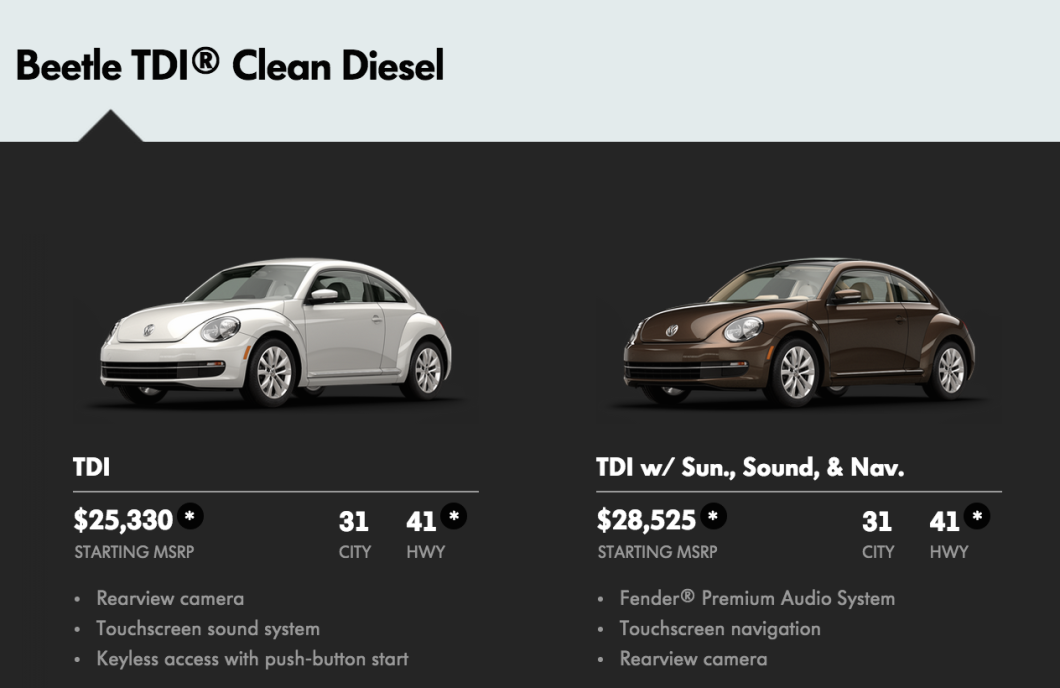Yes, Owners Of Recalled Volkswagens Can File Deceptive Marketing Complaints With The FTC
Because, as the EPA points out in its enforcement order, Volkswagen marketed the affected vehicles as “clean diesel,” it’s possible that the company’s advertisements of the vehicles constitute as deceptive.
The FTC Act prohibits companies from “unfair or deceptive acts or practices,” and is frequently used by the agency to bring civil complaints against businesses that mislead consumers about their products.
Even on Friday, after the recall was announced, the carmaker continued to tout the affected vehicles as “clean diesel.”
“Stinky, smoky, and sluggish. Those old diesel realities no longer apply,” the VW website states. “Enter TDI Clean Diesel. Ultra-low-sulfur fuel, direct injection technology, and extreme efficiency. We’ve ushered in a new era of diesel.”
While it’s possible that some VW owners couldn’t have cared less about the “clean diesel” aspect of the recalled vehicles, the extent to which the carmaker talked up the environmentally friendly features indicates that Volkswagen was likely targeting consumers in the market for a vehicle with cleaner emissions.
A spokesperson for the FTC confirmed to Consumerist that consumers affected by this recall can file a complaint with the agency if they feel that they were misled into making this purchase.
Those interested in filing a complaint related to the Volkswagen recall and potential deceptive advertising issue can do so by visiting ftc.gov/complaint or by calling 1-877-382-4357.
While it’s unclear whether the FTC will ultimately pursue any action against the carmaker, the spokesperson notes that “in general, all complaints are considered legitimate, and they may nor may not result in enforcement actions.”
Though we don’t know if there will be further involvement by the FTC, we do know that private legal actions against Volkswagen have already begun.
Within hours of the recall being announced on Friday, at least one class-action suit had already been filed against the carmaker.
The complaint [PDF], filed in a U.S. District Court in San Francisco, accuses Volkswagen fraud by concealment, along with violations of multiple California statutes.
In the lawsuit, the plaintiff — who hopes to represent the hundreds of thousands of people who purchased these cars — argues that buyers were not only tricked into buying these particular vehicles based on the “clean diesel” marketing, but that they paid a premium for the supposed feature.
On Friday, the EPA ordered Volkswagen to recall nearly 500,000 vehicles over concerns the automobiles expose people to harmful pollutants.
The EPA initiated the recall through a notice of violation [PDF] of the Clean Air Act, after an investigation found the automaker intentionally installed software in 482,000 diesel 4-cylinder model year 2009 to 2015 Volkswagen and Audi vehicles as a way to evade emissions standards for certain pollutants with a range of serious health effects.
The software – known as a “defeat device” – was first detected during independent analysis by researchers at West Virginia University who were working with the International Council on Clean Transportation, a non-governmental organization. The findings raised questions about emissions levels, and the EPA, along with the California Air Resources Board, began further investigations into the issue.
“Using a defeat device in cars to evade clean air standards is illegal and a threat to public health,” Cynthia Giles, Assistant Administrator for the Office of Enforcement and Compliance Assurance, said in a statement.
Models covered by the recall include the model year 2009 to 2015 Volkswagen Jetta, Beetle, Golf, and Audi A3, as well as model year 2014 to 2015 Volkswagen Passat sedans.
According to the notice, the “sophisticated software algorithm” in the vehicles is programmed to detect when the car is undergoing official emissions testing, and to only turn on full emissions control systems during that testing.
However, the effectiveness of these vehicles’ pollution emissions control devices is greatly reduced during all normal driving situations.
Following the recall order, our colleagues at Consumer Reports decided to suspend the “Recommended” ratings it had previously given the Passat diesel and Jetta diesel.
“These recommendations will be suspended until Consumer Reports can re-test these vehicles with a recall repair performed,” reads a statement from the publication. “Once the emissions systems are functioning properly, we will assess whether the repair has adversely affected performance or fuel economy.”
On Sunday, VW announced it would stop selling all model year 2015 and 2016 — both used and new — Volkswagen and Audi models equipped with 4-cylinder turbo diesel engines marketed as “clean diesel.”
Martin Winterkorn, VW CEO, publicly apologized on Sunday for the issue.
“I am personally deeply sorry that we have broken the trust of our customers and the public,” he said in a statement, adding that the company would “fully cooperate” with both federal and independent investigations.
The EPA’s investigation — and subsequent recall — could eventually lead to a fine or penalty for Volkswagen.
Under the Clean Air Act, the Justice Department could impose fines of as much as $37,500 for each recalled vehicle, for a possible total penalty of as much as $18 billion.
Winterkorn said the company would “do everything in order to reverse the damage this has caused.”
Want more consumer news? Visit our parent organization, Consumer Reports, for the latest on scams, recalls, and other consumer issues.


